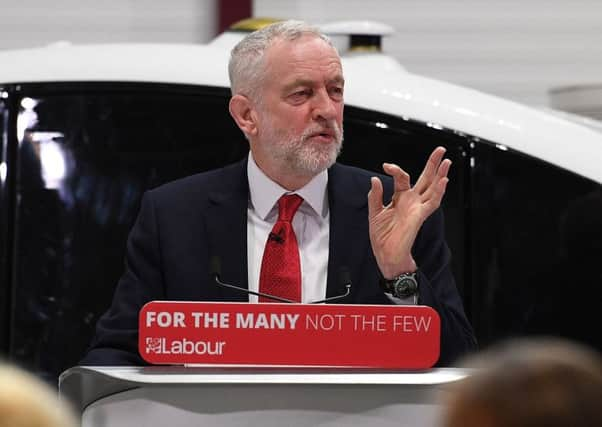Brian Monteith: Corbyn's Brexit plan is all about ousting May


After months of turning left, right or reversing, Corbyn announced a new policy on Brexit, by which I mean one that is utterly and completely different from what he promised in last year’s general election.
He spoke standing in front of a car, a driverless car to be exact, in Coventry North West, which voted 58 per cent to leave the EU. A more fitting metaphor one could not have asked for.
Advertisement
Hide AdAdvertisement
Hide AdChanging his mind is Corbyn’s right, but it could leave many who voted Labour and “Leave” feeling betrayed and ignored – for it is nothing other than a U-turn.
Corbyn abandoned his previous promise that the UK would leave “the” EU’s Customs Union to instead join with the EU in “a” Customs Union.
The difference between “the” and “a” Customs Union might appear puzzling, or a point of grammatical semantics – but I can assure readers it is very, very important. It allows Corbyn to say he is not staying in “the” same Customs Union, but seeks “a” different Customs Union that he would have to negotiate.
Let us remind ourselves what a Customs Union does – being inside it means there are no tariffs applied to goods that are exported or imported to other countries within it, but there is a tariff wall facing all countries outside it. In other words, there are no tariffs on wine and whisky that travel between Scotland and France.
Advertisement
Hide AdAdvertisement
Hide AdIn comparison, wine imported into the EU from the United States faces an EU tariff averaging four per cent – but the US does not apply any tariff to Scotch whisky for, as an independent state, it sets its own tariffs.
The only condition under World Trade Organisation rules is that the US (and everybody else) must apply the same rate of tariff for a specific item such as wine or Scotch to every country – you cannot charge one country more or less than another.
The result of this EU tariff wall is that food prices in the UK are on average 17 per cent higher than if we had open trade and could import without the tariffs from, say, African, Asian or South American countries. When we leave the EU we automatically leave the Customs Union, and can set our tariffs lower or at zero.
If, however, we stay in the Customs Union, we lose any ability to agree new trade deals with other countries that remove or reduce tariffs.
Advertisement
Hide AdAdvertisement
Hide AdDespite our forefathers saving most of the EU from Nazism and then Communism, despite the billions we’ve paid to the EU over the years, remaining in the EU’s Customs Union will come at a cost to the UK Government – a cost greater than if it simply paid the tariffs on behalf of our exporters (we know this because it already pays more than the total cost of tariffs!).
We can also expect other demands to be made, such as maintaining open immigration from the EU. Why has Corbyn changed his position?
Simple; by supporting “a” different Customs Union, he can then side with a small band of Tory rebels who support “the” existing Customs Union and try to defeat Theresa May’s government in the hope of forcing her resignation and bringing about a General Election.
It is not about securing the best Brexit deal, it is about keeping his own party united while dividing the government so it falls.
Advertisement
Hide AdAdvertisement
Hide AdThe suggestion it will allow a “soft border” between Northern Ireland and the Republic is a erroneous, for Turkey, which is inside the Customs Union, has a “hard border” with the EU.
The Labour Party is indeed a driverless car, offering no known destination, with its passengers disagreeing over which way it should go.
We would get into that car at our peril.
